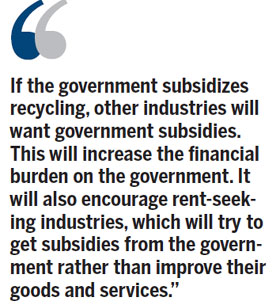Why we shouldn't subsidize the recycling business
Updated: 2014-03-27 08:28
By Raymond So(HK Edition)
|
|||||||||

There is no doubt that there is a garbage-handling problem in Hong Kong. The extension of landfills and construction of an incinerator are greatly needed. Also, we cannot handle the garbage problem simply through landfills and incineration. The concept of "reduce, reuse and recycle" should be emphasized. If we can implement the "3Rs" then we can relieve pressure on current landfills.
If people were asked whether they support the idea of recycling, I am sure the overwhelming majority would say yes. The problem, however, is how to support recycling through action. Hong Kong already has some recycling businesses. However, most recycled materials are not for domestic use. Very often, recycled materials are packed for export to other places for recycling. But there is a reason for the low use of recycled materials in Hong Kong. Land is expensive. If we are to use recycled materials, we need to set up manufacturing plants. So it is difficult to use a large amount of recycled materials domestically.
Some people believe the government should subsidize the recycling industry. The government needs to pay for the handling of garbage - such as the costs associated with landfills and incinerators. People advocating government assistance say that if the recycling business is subsidized, then all recycled materials can be used. This way, a greater percentage of garbage can be recycled. This will help relieve pressure on landfills. Also, the proposed subsidy could also help develop a domestic recycling business.
On surface, this view seems to have some merit. In monetary terms, it is true the government needs to pay for the handling of garbage. It is not just the simple arithmetic of spending money. There is the much more complicated matter of how public funds should be spent.

First, the use of public money to support a particular industry is problematic. In Hong Kong, there is a widespread belief that the free market is good. The invisible hand will allocate resources in the most efficient way. If the government were to subsidize the recycling industry, it would be hard to justify why it has a preference for the industry. Other industries might also demand similar treatment - citing similarities with the recycling business. Then the government will have a difficult time deciding which industry to subsidize. The government should not compete with the private sector in wealth creation. So if the government subsidizes the recycling industry, it will then need to help other industries. This will undermine the free-market mechanism.
Second, if the government subsidizes recycling, other industries will want government subsidies. This will increase the financial burden on the government. It will also encourage rent-seeking industries to try to get subsidies from the government rather than improve their goods and services. A government subsidy will lower the incentive for organizations to compete in the market place because they are guaranteed funding.
Third, we have to consider the future of the recycling industries. Recycling is facing tough competition worldwide, as environmental regulations are getting tougher. This is forcing the recycling industry to be internationally competitive. But if government subsidies are introduced this will discourage the recycling industry to modernize or upgrade technology.
Also, a chain of other support industries are involved. If the government subsidizes recycling, it may mean further subsidies for upstream and downstream industries are needed. This will lead to an endless list of industries wanting to be subsidized.
There is no doubt we should support recycling. However, support should be policy driven and not solely financial support. The government can have a clear policy on supporting the recycling industry, such as business facilitation measures, land grants or proactive legislation. But financial subsidies are not needed.
The author is dean of the School of Business at Hang Seng Management College.
(HK Edition 03/27/2014 page9)